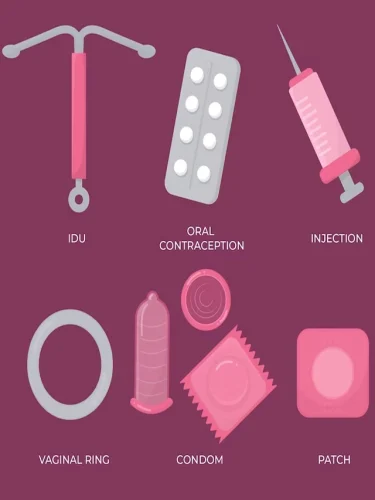Last Updated on March 28, 2025

In today’s society, family planning has become an essential part of life for many individuals. With the advancements in medical technology, there are a plethora of options available when it comes to contraception. However, along with the benefits of contraception, there are also associated side effects that need to be taken into consideration.
In this article, we will delve into the various types of contraception and the side effects that come along with them.
Types of Contraception
Contraceptive strategies encompass a diverse array, from natural approaches to the use of barrier methods and hormonal interventions. Each possesses distinct advantages and potential drawbacks, necessitating a personalized selection to align with one’s health and lifestyle.
Natural Family Planning
Natural Family Planning, often referred to as fertility awareness, is a method that involves monitoring and understanding the patterns of a woman’s menstrual cycle to predict fertile and infertile periods. By abstaining from sexual intercourse during fertile periods, pregnancy can be avoided. This method requires careful tracking of the menstrual cycle, which can be done using various tools and techniques such as temperature charting, cervical mucus monitoring, and calendar tracking.
Although it is free from side effects and does not require any medical intervention, it demands a high level of commitment and responsibility from the user. The efficacy of this method can be compromised by irregular menstrual cycles and other factors; hence, it may not be suitable for everyone.
Barrier Methods
Methods of contraception, including condoms and diaphragms, work by physically blocking sperm from reaching and fertilizing an egg. These methods are popular because they are non-hormonal and can be used as needed. Condoms also have the added benefit of protecting against sexually transmitted infections (STIs). However, it is important to note that the effectiveness of these methods depends largely on correct and consistent use.
Failure rates can be higher compared to hormonal methods, and there is always the risk of human error, such as a condom breaking or slipping off or a diaphragm being inserted incorrectly.
Hormonal Methods
Hormonal methods include pills, patches, injections, and vaginal rings, and they work by altering a person’s hormonal balance to prevent ovulation. These medications are highly effective and have a lower risk of human error. However, they come with a range of side effects, including mood swings, weight gain, and potential risks for certain types of cancers and cardiovascular diseases.
Some women may also experience changes in their menstrual cycle, such as irregular bleeding or amenorrhea (absence of menstruation). In addition, hormonal methods require consistent use and adherence to a schedule, which may not be suitable for everyone.
Intrauterine Devices (IUDs)
Intrauterine devices (IUDs) are small, T-shaped tools that are placed inside the uterus as a form of contraception. There are two primary kinds of IUDs: copper-based and hormone-based. Copper IUDs work by releasing copper into the uterus, creating an environment hostile to sperm. On the other hand, hormone-based IUDs release progestin, a hormone that thickens the cervical mucus, preventing sperm from reaching the egg. IUDs are renowned for their effectiveness and durability, with some models providing protection for up to a decade.
Nevertheless, the insertion process can sometimes result in complications, including infections or uterine perforations. Additionally, a subset of women may experience side effects like irregular bleeding or abdominal cramping.
Emergency Contraception
Emergency contraception is a method used to prevent pregnancy after unprotected sex or contraceptive failure. It typically involves taking a pill that contains a high dose of hormones that work to prevent ovulation, fertilization, or implantation. Emergency contraception is most effective when taken as soon as possible after unprotected sex and can also be used up to 5 days later. It is important to note that emergency contraception is not intended to be used as a regular form of birth control and should only be used in emergencies.
Permanent Methods
Permanent contraception methods consist of tubal ligation in women and vasectomy in men. In tubal ligation, the fallopian tubes are tied or sealed to inhibit the egg from traveling to the uterus. On the other hand, a vasectomy entails the cutting or sealing of the vas deferens, thereby stopping sperm from meeting the egg. These methods are highly effective and provide permanent protection against pregnancy.
However, they are not easily reversible and should only be considered by individuals who are certain they do not want to have any more children in the future.
Side Effects of Contraception
Now that we have established the different methods of contraception, let’s delve into the potential side effects.
Hormonal Side Effects
Hormonal forms of contraception, such as birth control pills, patches, injections, and hormonal intrauterine devices (IUDs), can cause a range of side effects due to the hormones they release into the body to prevent pregnancy. Common side effects include mood swings, which can range from mild irritability to more severe emotional changes. Changes in libido are also common, with some individuals experiencing an increase or decrease in sexual desire. Weight gain is another common side effect, although studies have shown that the relationship between hormonal contraception and weight gain is complex and not fully understood.
Acne can also be a side effect, although some individuals find that hormonal contraception improves their acne. It’s important to remember that not everyone will experience these side effects, and they may vary in severity from person to person. If you experience any concerning side effects, it’s important to contact your healthcare provider immediately to discuss your options.
Non-Hormonal Side Effects
Non-hormonal forms of contraception, such as condoms, diaphragms, and natural family planning, also have their own set of potential side effects. Methods, such as condoms and diaphragms, can cause irritation for some individuals. This can be due to an allergy or sensitivity to the materials used in the product or simply due to friction during intercourse. Diaphragms can also cause vaginal dryness in some individuals. Natural family planning, which involves tracking menstrual cycles and other fertility signs to determine when a person is most fertile, can be time-consuming and requires consistent and accurate tracking in order to be effective.
Emergency Contraception
Emergency contraception, also known as the morning-after pill or “Plan B,” is a medication that can be taken after unprotected intercourse to prevent pregnancy. While it is an effective method of preventing pregnancy, it can have side effects. Common Plan B side effects include nausea and vomiting, which can be reduced by taking the medication with food. Headaches are also a common side effect. Some individuals may also experience irregular bleeding or changes to their menstrual cycle after taking emergency contraception.
Long-Term Side Effects
Hormonal methods of contraception have been associated with long-term side effects, such as an increased risk of breast cancer and blood clots. However, the risk is relatively low and varies from person to person.
Conclusion
Contraception is an important aspect of family planning, and there are numerous options available. It is important to find the option that works best for an individual based on their lifestyle and preferences. While all methods of contraception come with side effects, it is crucial to weigh the pros and cons before making a decision. If any concerning side effects occur, it is essential to contact a healthcare provider.
As for emergency contraception, it is a useful tool, but it should only be used in emergencies and not as a primary form of birth control. In conclusion, safe sex and comprehensive family planning are vital for a healthy and fulfilling life.
Benefits of Peptides: The Ultimate Guide to Buying High-Quality Supplements at Competitive Prices
Peptides are short chains of amino acids, that…
What Research Shows on Food Dyes: Red Dye No. 3 Is Banned. Will the FDA Take Action on More Food Colorings?
In a significant move, the U.S. Food and…
50 Well-Known Foods That Contain Red Dye No. 3 | 2025
In a world where health-conscious choices are more…
Are Tampons Safe? What You Need to Know and Safer Alternatives | 2024
A recent study published in Environmental International has…
What are the best barrier methods?
The male condom and diaphragm are considered the most effective.
What are barrier methods safety?
No substances enter the bloodstream to impact the entire body or a woman’s menstrual cycle. Barriers only need to be employed during sexual intercourse, and both male and female condoms reduce the risk of contracting sexually transmitted diseases.
What are non-barrier methods?
Two types of non-barrier contraception methods to prevent pregnancy include contraceptive pills and sterilization.
- Successible Life Staffhttps://successiblelife.com/author/successible-life-staff/
- Successible Life Staffhttps://successiblelife.com/author/successible-life-staff/
- Successible Life Staffhttps://successiblelife.com/author/successible-life-staff/
- Successible Life Staffhttps://successiblelife.com/author/successible-life-staff/




